June is a month connected with the National Team basketball. Most of you will think, not unjustly, of the historic Eurobasket 87 and you will be right. Nevertheless, it was another June, far away, the one who started the magical journey of basketball, as the newspapers of the time and of his national representation wrote about the beautiful sport.
On June 25, 1936 the first match of our representative group was recorded. In Istanbul, under the floodlights and on the parquet (unprecedented luxurious conditions for the Greek basketball players), Turkey defeated Greece 49-12 and gave a kick to turn around, a fairy tale to begin...
In June 1936, Olympiacos was celebrating the third of five consecutive football championships (1933-38, it had also won in 1931 but the 1932 title was mediated by Aris), the National Football Team with the star player Kostas Houmis, its great balladeer National Piraeus was winning 5-1 in Egypt, Jim Londos was reigning as world champion wrestler in America, while the Greek track and field champions were preparing for the Olympic Games of Berlin. Some others declared participation in the Labor Olympiad, which the Popular Front government in Spain had decided to organize (as a response to Hitler's Germany) but never started, as the civil war with Franco's Falangists broke out.
The newspaper "Athlitismos" organized a gallop for the best Greek football player with Giannis Vazos, the demon scorer of Olympiakos, defeating Antonis Mygiakis, the dynamic center-forward of Panathinaikos.
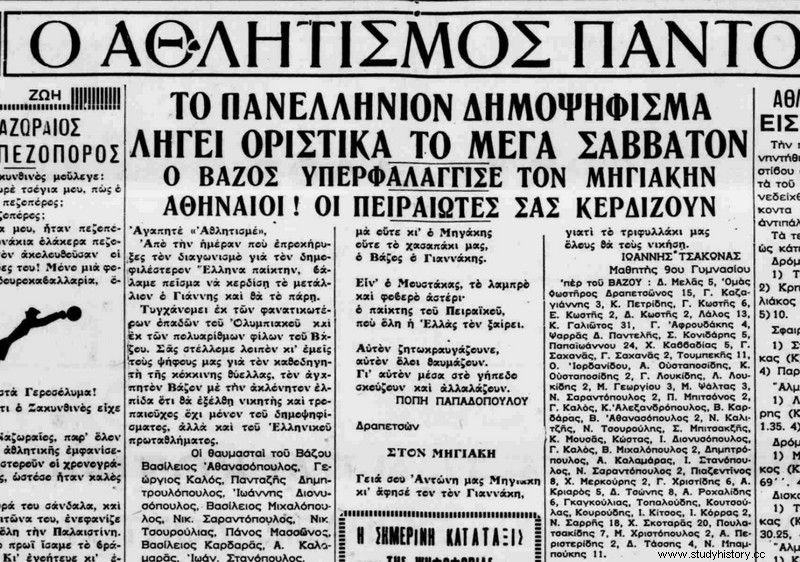
Basketball rarely saw the light of publicity. Sporadically and where the results of the championship were published (either at the local or pan-Hellenic level). A handful of people played with the leather balls (they still didn't have the original orange color) first in Thessaloniki and then in Athens. Little by little, however, the sport was gaining friends.
The final phase of the Panhellenic championship (1936) took place in Thessaloniki and it was won by Near East, which had replaced the team from the University of Athens. It was the Panhellenic championship, with the organization starting in 1927-28 but being interrupted after 1930 for three years. The Caesarians also had in their ranks an American named World, who worked as a professor at the American college.
The college professors knew basketball, they even playedhigh-techniqueshow games according to the press, against teams of coaches. In one of them we read the names of Mike Stergiadis, pioneer of Greek basketball (and student of James Naismith) but also of the emblematic Christos Svolopoulos, athlete, coach, referee and later journalist.
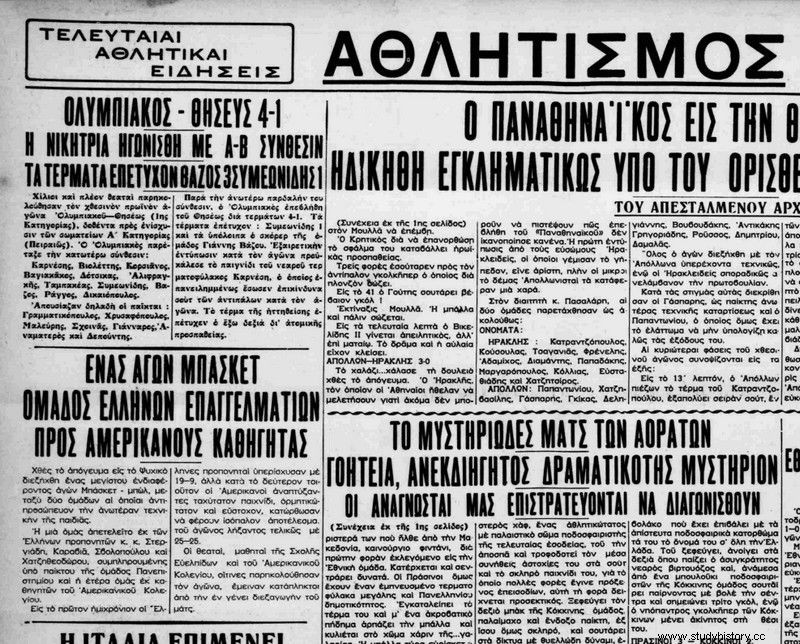
Somewhere there, SEGAS, which had sports under its auspices, decided to give the green light for the formation of the National Team.
The veteran journalist Sotiris Theologidis he got to know basketball from a very young age. A graduate of the famous E Gymnasium, a classmate of Yiannis Ioannidis and a class before that of Dionysis Savvopoulos, he designed the sports pages of the newspaper "Thessaloniki" and wrote passionately about basketball. In 2014, his first book "Stories from the Basket" was released.
The maiden National Basketball Team is one of the book's chapters:"An occasion for our National Team to measure its strength, for the first time, was an invitation, but also a challenge, received from Turkey.
The sports leadership of the neighboring country had decided to take part in the Berlin Olympics (1936), that is, where basketball had been accepted as an Olympic sport for the first time.
The Turks aspired to distinguish themselves in that event and invited our National Team for a friendly preparation match. Many of our football teams had already competed in Istanbul.
SEGAS accepted the request and Ethniki left, with the best possible composition, without respecting union balances.
Reading its composition, but also the qualifications of the players, we find (based on a very informative publication of the newspaper Athlitismos), that the core of the National team was the University team.
The players selected were:
Alkis Angelou (University), Philippos Bahomis (University), Nikos Koutsalexis (University), Giorgos Sapoundzakis (Near East), Theoharis Amarantidis (Piraikos), Yiannis (Giagos) Nanes (Herakles Thessaloniki), Antonis Skylogiannis (Panelleniou) and Vassilis Vassis (Panioniou).
The team was accompanied by Kostas Niatas and the coach, an old acquaintance of ours, Mike Stergiadis, an executive of the Athens Football Club, who had been active in the capital since the early 1920s.
The national team was presented in the publication as the "favorite" of the meeting despite the fact that the match would take place away from home.
The editor seemed to be unaware that the match would take place in a closed hall with a parquet floor, i.e. under conditions completely different from those in which the Greek basketball players were competing at the time.
He also seemed to be unaware that the Turkish basketball players, like their coach, were mostly graduates of the Robertian School.
Sports, and especially basketball, were part of their basic sports education. After all, the presence of the YMCA in Istanbul had preceded it".
The first training session
The SEGAS invitation did not concern only 8 players (who traveled to Istanbul) but 20. The first training session took place on May 31, 1936, at theLaiko Gymnastrio , i.e. at the historical stadium of Fokianos, so as not to get confused.
Under the title "Basketball's first internationals" supertitle "Bosphorus and Hagia Sophia" and subtitle "Trainings and dreams", the newspaper Athletiki Das (precursor of the Sports Echo) had a glossy description of that historic "first" for the National Basketball Team.
The impatience of the internationals to taste the trip to Istanbul was transferred to an enthusiastic training session, where the "selector" (in French the elector) Kostas Niatas saw the international candidates present themselves "with joy, emotion, fun and above all appetite" (s.s spelling and syntax of the time). With these feelings they gave us a first class game, smooth, impetuous, technical and efficient. A game with other reasons, which makes us believe that surely our national colors will achieve much more than what they achieved last time in Bucharest in another game (allusion to the defeats of the national football team in the Balkan Cup)..."
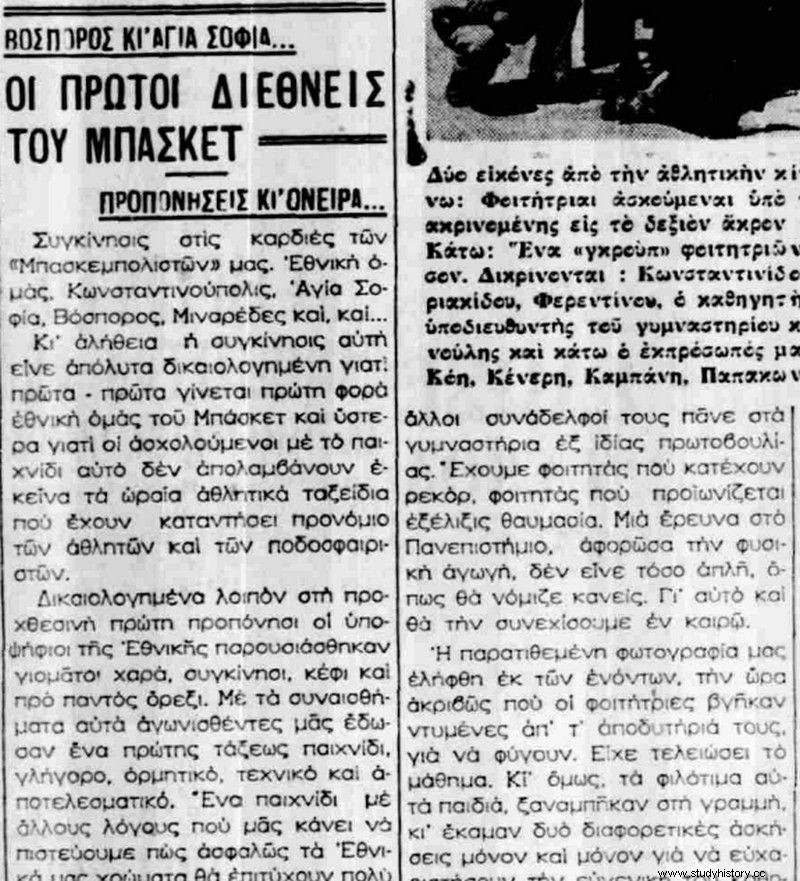
The newspaper also writes that it is time and must "for our fans to get to know and love some other sports that are long overdue in our country, while they are incomparably superior, more beneficial and nobler than some others, which have unfortunately absorbed them".
Then we learn that in the doubles of the first training, on the one hand, Vassis, Sidiropoulos, Bahomis, Sapundzakis and Amarantidis played, and on the other hand, A. and I. Angelou, Koutsalexis, Vantzis, Marinakos and Harmatos. We will never know the real 20, since "Athlitismos" boldly noted that all the names are missing (!) while "Athletikis Mera" wrote that Mr. Niatas "was thrilled with the above ex player (the Angelou brothers and the Koutsalexis, Bahomis, Sapoundzakis, Amarantidis) who will make up the national team completed with Skylogiannin, Nanen and Andritson. Onward with the good! The beginning has been made! And the "beginning is half of everything..."
The best leader, the chicks and the ... cockroach!
"Sports" returns to present in an innovative way the internationals who would eventually travel to Istanbul. The text is unsigned, but it must belong to a basketball player, and he knows details about each one individually and at one point reveals that he never tried to steal the ball from Sapundzakis!
The newspaper urges football fans to pay attention to basketball, because it is worth it" notes the delay on the part of SEGAS for the formation of the National Sports Teams, but puts a colon and comments: "Anyway. The beginning was even late. After all, "it's never too late". And let us comfort ourselves with this thought. Let's console ourselves, that is, by hoping that next week's international meeting will mark the beginning of a better tomorrow for such a great, fruitful and beneficial but neglected part of our sport"
But who exactly were the first international basketball players:
F. Bachomis: "One of the oldest basketball players. He has been competing since 1927 as a central (center) hunter of the University of Athens. The Athenian championship of 1933 became the occasion to present to us the surprise of Bahomi... Today he rightly holds, by general admission, the title of "the best basketball player in Greece". A true maestro, he inspires the players of his team with his top-class game and his indomitable energy... We must say that he is also the tallest player in the team. Just ... 1.95 (p .s theoretic for the data of the time). He is 23 years old and was chosen by popular vote as the leader of our first national team".
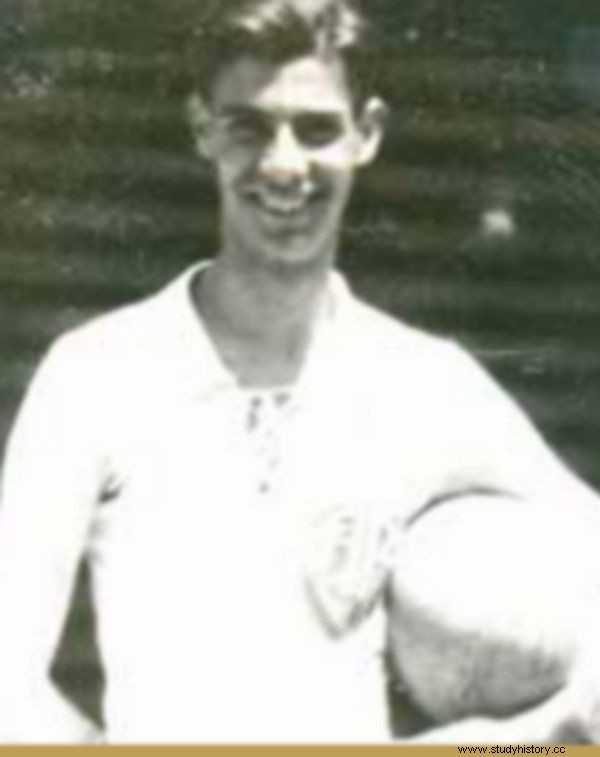
A. Angelou: "The great revelation of this year's championship. A find of the demon Stergiadis, in two years of playing basketball, he managed to emerge as the best grand (guard, he means) of what the Greek teams have presented to us... He is only two points shorter . That is, 1.93m. May 19 Games, he also has the title of Benjamin of the team".
N.Koutsalexis :"He is in line with Angelou in terms of development, height, team, age, titles. He is also a find of Stergiadis, a youngster in the team that won the championship with his "sword"... He has also been competing for two years (he is only 19 years old... three days older than Angelou) and has a height of 1.90. We see in his face one of the most evolving players..."
Th. Amaranth: "The rubber man! The cockroach man! The devil man! That's what Amarantidis is. I'll start with him upside down. He's 1.65 tall! And yet he's a siphon, his dribbling is an artifice, his goal shot.... He's 25 years old (that's what he says. God and his soul)... He played for the first time in Ethnikos, then in Near East, then again in Ethnikos, then in Piraikos and from last year in the University, since the palibas (s.s. that's what the Bahomis) remembered after 7-8 years that he is a student!"
C. Sapundzakis: "Bahomis says of him 'this is about a real talent'... He is a master of the dribble and the most impressive player. But what do you want? To understand Sapundzakis, one must be his opponent. And the underdog had the... unfortunate enough to find himself in this position many times. Do you want to know what I did? I never dared to try to cut him off! .... Sapundzak's height is 1.85 and his age is 22 years. He is now a reserve lieutenant and he works out every day his soldiers in ... Basketball".
I. Nanes: "We admired him in the prestigious basketball championship, in which his team (Heracles of Thessaloniki) was crowned champion. He has been playing guard since the age of 27 and will be, after Angelos, the most ideal defense that our national colors could ever present. Nanes is 1.88 tall and he is 25 years old".
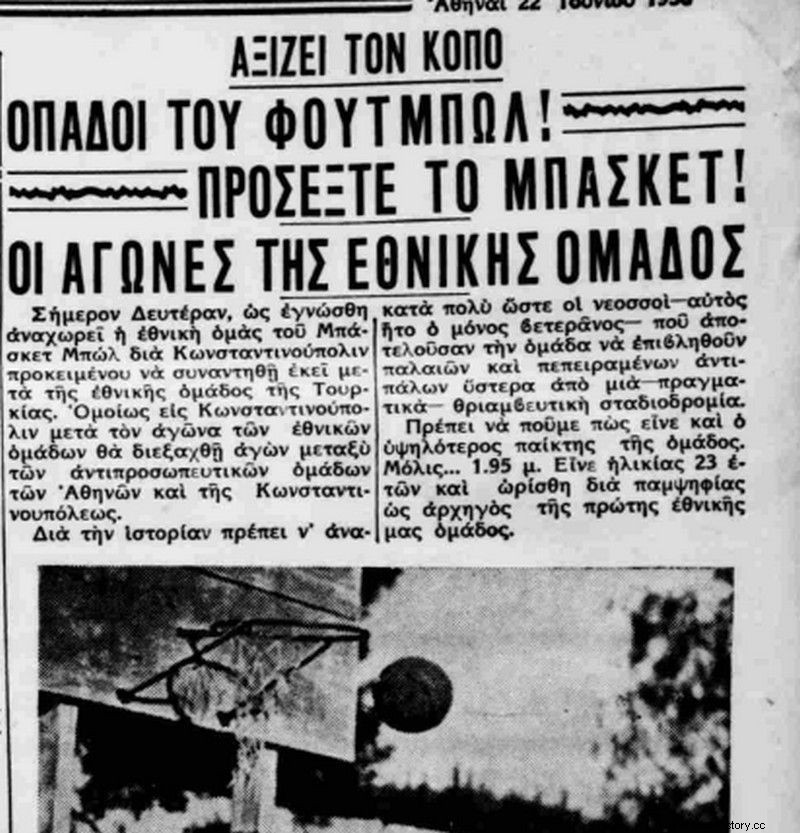
A. Skylogiannis :"Endurance, vigor and art personified. This is what Skylogiannis is. Agile, efficient, vigorous chaser. Tireless, quick, intelligent full-back (sic). He performs with equal success in all sports that is why he has rightly been called the rector of athletics... The bad thing is that the burnt one is a soldier and he is afraid that during their tour... Sapundzakis will exhaust all his rigor.... Skylogiannis' height is 1.76 and his age is 22 years old".
B Vassis: ¨The most respected and liked player of the team. He has been fighting with "his heart" for years and is without exaggeration the animator of Panioni. His election as the third guard of the national team is a success of the sports committee. We have absolute confidence in his great loyalty and good game, which is why we believe that he will properly cover any gaps that may arise".
Uneven landing on the floor (and at the mercy of the referee)
Despite the optimism that existed before the match, due to the talent as well as the physical qualities of the first internationals, the start of the National Team looked like a bumpy landing. Sotiris Theologidis explains in his book, how the heavy 49-12 in favor of the Turks was formed:
"The first game was held on 25/6, under the worst possible conditions for our National Team, which crashed with 49-12! Specifically, our National Team played at night, in the closed hall of the YMCA of Istanbul (the telegram on refers to as HAN), under the light of the floodlights, i.e. under conditions completely unprecedented for Greek basketball players.
The result of the first half (13-4) shows that, at least in the first part, they fought hard.
However, the response from the City focused only on the arbitration of the Turkish "referee", which it described as "scandalous".
According to what was broadcast from Polis, his decisions resulted in the Greek team playing in the second half without Angelou and Sapundzakis, who were also their best players.
Our two internationals were forced to leave, after "non-existent personal errors" he had charged them.
The points for our national team were scored by the following:Bahomis, Angelou 4, Skylogiannis 4, Nanes 2, Amarantidis 2, Sapundzakis, Vassis and Koutsalexis.
On the bench of the Turkish team was a connoisseur of the sport, Turkos Nadolski, who was also a professor at the Robertio School.
The composition of his team was, according to what is reported on the internet:Naili Moran (Galatasaray, captain), Feridun Korai (Galatasaray), Sadri Usluoglu (Galatasaray), Hazdari Penso (Barkhoba), Jack Habib (Barkhoba ), Dionis Sakalak (Kourtulus), Hayri Arsebuk (Galatasaray) and Nihat Erdug (Galatasaray).
The points for the Turkish winners were scored by:Habib 20, Usluoglu 11, Penso 6, Koray 4, Moran 4, Sakalak 2 and Arsebuk 2"
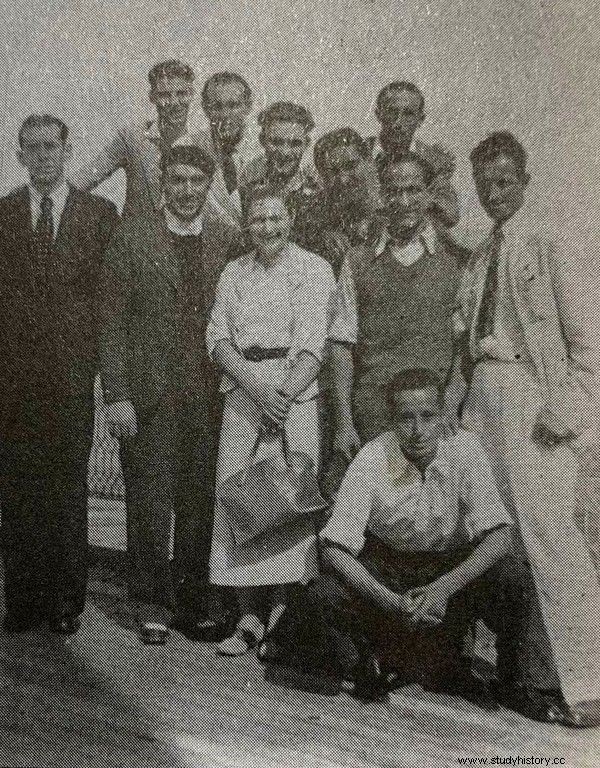
It was also the first international match for the Turkish national team. Neighbors looked more prepared, Neill Moran team captain was a real super athlete. Discus thrower, boxer, swimmer, pole vaulter, he played 481 basketball games, while after the end of his career he became a referee, just like Antonis Skylogiannis who in 1960 whistled at the Olympic tournament in Rome.
Two months later, in fact, they traveled to Berlin to take part in the first basketball tournament of the Olympic Games, where they were eliminated in the qualifiers with two defeats (from Chile 30-16 and from Egypt 33-23)
According to the Greek press, but also the testimonies of the Greek internationals, the Turkish referee of the match played an important role in shaping the defeat. The "Sports Day" he wrote that the refereeing was so scandalous that after the "first 10 minutes they started booing him - to their credit - and the Turkish fans, apart from the expatriates who, overcome by the gross injustice, started leaving the stadium in obvious disappointment shouting at our players to follow them too. In the end, the ... referee won the Greek national team 49-12"
"Sports" added to the same response that "our international heavy bearers of the unexpected and unprecedented injustice, were completely speechless, reserving to speak on the evening of next Friday"
The revenge, the sketches and the ... touches
The two teams played again as mixed teams of Athens and Istanbul. This time the Greeks were better prepared and won. Sotiris Theologidis notes:
"Followed, after two days, the match of the mixed teams of Athens-Istanbul, that is, our national team without Nane. We do not know the composition with which the Turkish team competed. The result, however, was completely different, since our representative group, as a mixed team of Athens, won the "rematch" with 27-19.
The Turks received the Greek mission, which returned in the same way on July 2.
Η ίδια εφημερίδα των Αθηνών φιλοξένησε τις εντυπώσεις των Κουτσαλέξη, Μπαχώμη και Αγγέλου, από τους δύο αγώνες, σε ρεπορτάζ που υπογράφει ο Νίκος Γκούμας (που υποδέχθηκε αλλά δεν συνόδευσε την αποστολή).
Και οι τρεις διεθνείς έδωσαν έμφαση στον παράγοντα διαιτησία, αλλά και στο ότι αγωνίστηκαν όχι απλώς κουρασμένοι, αλλά «τσακισμένοι» από το ταξίδι. «Την πραγματική μας αξία τη δείξαμε στο δεύτερο παιχνίδι», υποστήριξαν.
Από την πλευρά του ο Στεργιάδης δε χαρίστηκε στους παίκτες του και είπε ότι «στο πρώτο παιχνίδι, όλοι πήραν 0, ενώ στο δεύτερο ο Σκυλογιάννης και ο Βάσσης 10 και οι υπόλοιποι 8».
Δυστυχώς από αυτή τη νίκη δεν διασώθηκαν άλλες λεπτομέρειες και ο αγώνας, καθώς επρόκειτο για ομάδες πόλεων, δεν καταχωρήθηκε στην ιστορία της Εθνικής Ομάδας. Εν τω μεταξύ ο Νίκος Γκούμας, αργότερα ο πρώτος αθλητικός συντάκτης που έγινε δεκτός στην ΕΣΗΕΑ, έκανε ένα ρεπορτάζ, που αποτύπωσε τις εντυπώσεις των διεθνών αλλά και το παρασκήνιο του ταξιδιού τους στην Κωνσταντινούπολη. Σκίτσα, εντυπώσεις και πινελιές που έγραφε ο υπότιτλος του άρθρου.
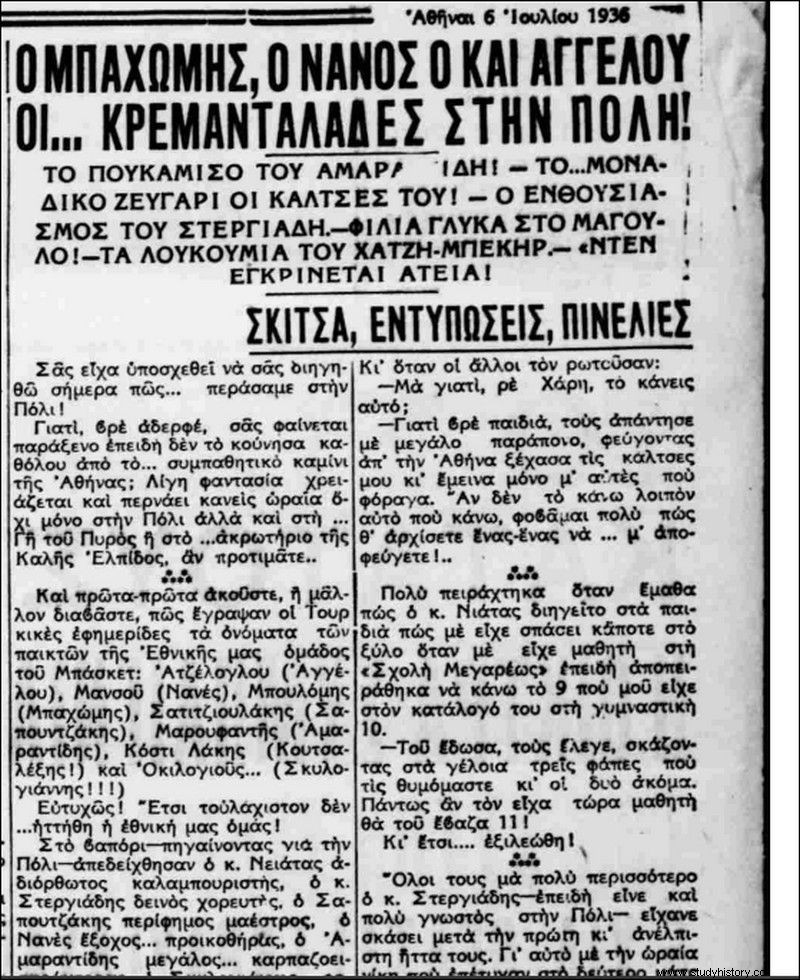
Ο συνάδελφος Νίκος Μπουρλάκης, τον προηγούμενο Φεβρουάριο, είχε δημοσιεύσει στην ιστοσελίδα της ΕΟΚ το σπαρταριστό κείμενο του αείμνηστου Ν.Γκούμα. Εκεί διαβάσαμε για τον χορευτή Μάικλ Στεργιάδη, τον "κουρτινέ" (λόγω πουκαμίσου) Αμαραντίδη, που ξυπνούσε κάθε πρωί πρώτος απ' όλους για να πλένει το μοναδικό ζευγάρι κάλτσες που είχε πάρει μαζί του (ξέχασε τα υπόλοιπα στην Αθήνα), την συγκίνηση των παικτών όταν ο κόουτς Στεργιάδης έβαλε τη μικρή του κόρη μετά τη νίκη στον δεύτερο αγώνα να τους φιλήσει έναν, έναν, τις σκηνές στο παζάρι της Κωνσταντινούπολης με τον ψηλέα Μπαχώμη να βγάζει το κεφάλι του και να φωνάζει "τεσεκιούρ εντερίμ" (ευχαριστώ), τον Νανέ που είχε 4 κοστούμια, αλλά γυρισε με δυο γιατί "στα χανουμάκια αρέσουν τα κοστούμια" και τα (πανάκριβα) λουκούμια που είχαν ανακαλύψει και ... λιανίσει οι Βάσσης και Σκυλογιάννης.
Οι μαρτυρίες του 1997
Το 1997 η ΕΟΚ σε μια από τις πρωτοποριακές εκδόσεις της είχε βγάλει ένα βιβλιαράκι για τα 61 χρόνια της Εθνικής Ομάδας. Κι εκεί διασώθηκαν οι μαρτυρίες του Άλκη Αγγέλου, που μετά το μπάσκετ ακολούθησε ακαδημαϊκή καριέρα έγινε καθηγητής της συγκριτικής φιλολογίας στο ΑΠΘ, ιδρύοντας ταυτόχρονα τον εκδοτικό οίκο "Ερμής" αλλά και του Νίκου Κουτσαλέξη.
Τα περιπετειώδη ταξίδια με τα καράβια "Ρομάνια" (στο πήγαινε) και "Βασιλιάς Κάρολος" (στο έλα), είχαν μείνει ανεξίτηλα στη μνήμη τους:"Μας κάλεσαν οι Τούρκοι, δική τους ήταν η πρωτοβουλία και τη δεχθήκαμε μετά χαράς" έλεγε ο Άλκης Αγγέλου, προσθέτοντας:"Διαβάζω κι ακούω ότι ο Γιαννάκης σταμάτησε στις 351 συμμετοχές κι εκστασιάζομαι. Εμείς παίξαμε τότε δυο ματς, από τα οποία διασώθηκε μόνο το πρώτο και χρειάστηκε να περάσουν τέσσερα χρόνια για να ξαναμαζευτεί η Εθνική Ομάδα, τις παραμονές του πολέμου.
Κι έξι χρόνια μετά, θυμάμαι ότι έγινε το τρίτο ματς στην ιστορία της Εθνικής Ομάδας, πάλι με τους Τούρκους. Δεν είχαμε και πολλές πολυτέλειες, εκείνη την εποχή, παίζαμε μια στις τόσες και κάθε φορά που τύχαινε κάτι τέτοιο, πετούθσαμε την σκούφια μας από τη χαρά μας. Άλλες εποχές τότε, άλλες τώρα, που το μπάσκετ κυριαρχεί στη ζωή μας"
Ο Νίκος Κουτσαλέξης είχε πει από την πλευρά του: "Οι Τούρκοι ήταν καλύτεροι από εμάς, αλλά είχαμε και ένα παραπάνω πρόβλημα. Εμείς μέχρι τότε παίζαμε στο χώμα, ενώ οι Τούρκοι μας έβαλαν σε παρκέ, όπου η μπάλα έκανε διαφορετικό γκελ και μέχρι να καταλάβουμε τι γινόταν χάσαμε".
Ογδόντα έξι χρόνια μετά, η Εθνική Ομάδα μετράει περισσότερους από 1.000 αγώνες και +600 νίκες, σε μια μαγευτική διαδρομή που συνεχίζεται με εκείνο τον ενθουσιασμό των οκτώ πιονιέρων του προπονητή και του συνοδού τους, που έμπαιναν στο πλοίο Ρομάνια, ανυποψίαστοι ότι από τα δικά τους χέρια θα γραφόταν το πρώτο κεφάλαιο μιας χρυσής ιστορίας...
